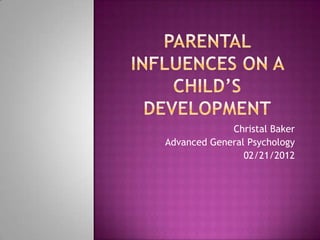
Au Psy492 M7 A2 Power Point
- 1. Christal Baker Advanced General Psychology 02/21/2012
- 2. Child abuse is unfortunately apart of our society. In order to put a stop to this behavior, it is up to the public to become knowledgeable of this occurrence and how to properly handle children, no matter what age. Parenting is a skill that can be taught by observation, reading, or sessions. There are both effective and non-effective parenting styles. (Cherry, 2012) Parents play an important role in their child’s lives, why not make it beneficial.
- 3. Authoritative: these parents establish rules and guidelines that their children are expected to follow. They are responsive to their children and willing to listen to questions. When children fail to meet the expectations, these parents are more nurturing and forgiving rather than punishing.”(Cherry, 2012) Authoritarian: these parent expects their children to follow rules and failure to do so results in punishment. These parents rarely explain the reasoning behind the rules, have high demands and are not responsive to their children. (Cherry, 2012)
- 4. Permissive: These parents have very few demands and rarely discipline. They often take the status of a friend more than a parent. (Cherry, 2012) Uninvolved: these parents have low responsiveness, little communication, and are detached for their child’s life. “These parents may even reject or neglect the needs of their children.” (Cherry, 2012).
- 5. Development, Communication and Involvement: is crucial during adolescent years. (Baron, 2008) Religion: is a major cultural influence, mental health outcomes are related to a family’s religious practices. (Vaaler, 2008) Family Roles: “While there’s nothing inherently wrong with roles, they become a problem when they’re rigid and shape poor choices as a teenager or adult.” (Tobin, 2008)
- 6. Behavioral patterns developed can include: violence, aggressive behavior, isolation, low self-esteem/image, poor grades in school, inability to keep relationships, depression, anxiety disorders and other social problems. (Bender, 2008) Personality characteristics: Parents become aggressive while the children become withdrawn. (DeHay, 2008) Children may learn to respect authority based on their parent’s behaviors. (DeHay, 2008)
- 7. Alcoholism and the influence on the family: “alcoholism becomes the family in ways in which it consumes the individual to where they can’t even be recognizable.” (Draper, 2008) Socio-economic status: the lower the status the more likely child maltreatment may occur. (Kim, 2004) It may also be due to stress, finances, or cultural traditions. (Kim, 2004)
- 8. Sexual response cycle: women with a history of sexual abuse does not have a normal sexual response cycle (Rellini, 2007) Can affect her relationships, marriage, and even personal satisfaction. (Rellini, 2007) It may be a direct onset to sexual desire disorders, orgasmic disorders, or arousal disorders. (Rellini, 2007) Can be treated through medications and therapy.
- 9. Why child abuse is eminent in society? It is proven that maltreatment is brought on by the parents themselves, but do parents realize how much influence they have on a child? Too what extent does a parent believe they do not have any more influence on their children? Does it ever stop? Parents do not ever stop being parents. (Baron, 2008) They are still a big part of their children’s life. It is important for parents to understand that even when children are grown up, they are still directly influencing their choices and how they are going to raise their own kids. (Cherry, 2012)
- 10. Baron, L. (2008) Understanding Adolescents. January 13 2012 www.psychology.com Bender, K. (2008) Interrupting the Cycle of Violence. January 13 2012 from www.lib.utexas.edu Cherry, K. 2012. Parenting Styles: The Four Styles of Parenting. January 13 2012 from www.psychology.about.com DeHay, T. (2008) Personality Characteristics of Perpetrating Parents and Maltreated Adolescents. January 13 2012 from www.lib.utexas.edu Draper, M. (2008) Adult Children of Alcholics. January 13 2012 from www.lib.utexas.edu Hessdorf, M. (2011) Dealing With Teenagers. January 13 2012 from www.psychology.com Kim, J. (2004) Neighborhood Effects on the Etiology of Child Maltreatment: A Multilevel Study. January 13 2012 from www.lib.utexas.edu Rellini, A. (2007) The Sexual Responses of Women with a History of Child Sexual Abuse. January 13 2012 from www.lib.utexas.edu Tobin, I. (2010) The Effect of Family Roles on Life’s Choices. January 13 2012 from www.psyhology.com Vaaler, M. (2008) Family Religious Involvement and Children’s Mental Health Outcomes. January 13 2012 from www.lib.utexas.edu